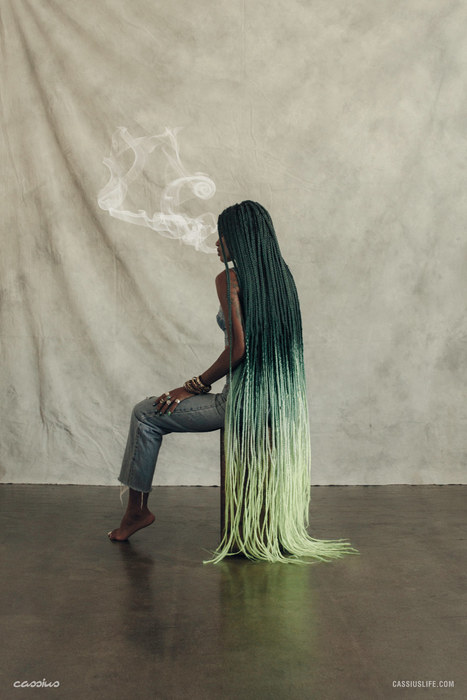
Source: Brandon Hicks / Courtesy of iOne
I came home the summer after my freshman year in college unwilling—if not unable—to return back to the rules and order that existed before I’d lived on my own-ish for the better part of a year. Staying out until 5am, why not? I was “grown!”
One evening, as I primped for yet another late night out, my mom screamed my name at a volume I hadn’t heard since I’d left for Howard. I rushed into the living room to find her holding the wooden marijuana pipe that had been tucked in my purse ‘discreetly.’ Whoops.
Mom glowered at me. “What is this?”
“A novelty pipe. Raven brought it back from Jamaica. It’s just a souvenir,” I replied calmly. Damn, I’m good, I thought to myself…until she put the well-used pipe that I purchased at the start of the school year to her nose and smelled it.
All I could do was laugh hysterically. Because no, I was not “good,” I was busted. But it was certainly funny.
“Are you high right now?” she screeched.
More laughter. I hoped Mom would join in, but it took her a day or two to stop seething. At that point, something amazing happened: we had an honest talk about weed. She opened up about how and when she’d used it during various times in her life. I explained that I hadn’t simply started smoking when I got to DC, but that I’d spent a good amount of time learning about the health benefits that marijuana has to offer and how criminalization had weaponized such a beneficial substance against people who arguably needed it most. I haven’t had to hide this part of my life from her, or my father, since then.
Yet this is the first time in my decade-long writing career that I’ve ever felt even slightly comfortable being open publicly about the topic of weed—or the fact that I smoke it.
I offer myself as evidence that a highly (haha) respected Black professional woman and mother can also be a regular marijuana user with one small caveat; the only reason that I’m able to disclose that is because I have a medical card that allows me to legally purchase and consume weed. If I hadn’t suffered a serious injury that afforded me a little piece of paper affirming my medical need for marijuana, I’d probably have written this while hiding behind a pseudonym.
It isn’t that I feel any shame or embarrassment about my responsible use of something that has aided not just my chronic pain, but my anxiety issues, sleeplessness, ADHD and, yes, my enjoyment of simple pleasures like food, sex and music—I don’t. Alas, I know what the toll might be for disclosing that I once smoked weed illegally. I am aware that people will still judge me now, including those who have the faint scent of blunt guts wafting through their own wastebaskets as they read this. As clear as I am that my life is a deliberate refutation to so much of what is expected of Black women in the United States, I’m equally clear on how we’re trained to contort into those boxes, boundaries and binaries in the first place.
Think about it. What are your earliest marijuana memories? Watching Big Mama lose her cool because your uncle came in her house smelling like “the reefers” again? Sitting through anti-drug programs in school that used cartoon characters and catchy slogans to convince you that your life was but one joint away from ruin? Maybe depictions of peaceful, pot-loving hippies and thugged-out, smoked out super-predators that were a staple in TV and film until recently?
So many of us were introduced to weed as something that was to be avoided and feared, and that people who embraced it were degenerates of some sort. We heard that “nice girls” or “good kids” don’t partake and that you’d never have a great education, career or family if you did.
The criminalization of marijuana and the criminalization of Blackness are inextricably linked and much of the distaste for the drug found in our communities exists, arguably, as a response to both. Respectability politics, which are far more complicated than social media dialogue might have you believe, are rooted in the belief that adhering to certain codes of decorum is the only way to survive the dangers of America.
However, we must ask ourselves how those attitudes have prevented us from challenging unjust drug laws and showing adequate sympathy to those who have been harmed most by them. What might be the benefit of legalizing a substance that is infinitely safer than alcohol and tobacco? Who profits from the barriers that prevent most patients in the U.S. from accessing legal, affordable medicinal marijuana?
If even Black folks can be swayed by the idea that smoking weed makes you some sort of degenerate, then there should be no surprise that the media and law enforcement agencies alike were quick to highlight alleged marijuana use by the likes of Trayvon Martin, Sandra Bland, Mike Brown and Philando Castile. These weren’t good Black folks—these were weed smokers!
Guess who else uses weed? A whole lot of people you know. Doctors, lawyers, sandwich artists, Soundcloud rappers, activists, scholars, stay-at-home-moms, retail workers, butchers, bakers, candlestick makers, teachers—like, EVERY teacher I know, seriously. From poor to rich, GED certified to PhD holders. It is virtually impossible that you have no marijuana enthusiasts in your life, if you aren’t one yourself.
As the cannabis industry continues to expand and weed becomes more present in pop culture via shows like High Maintenance and Bong Appetit, it’s imperative that Black women recognize exactly what we have lost at the hands of prohibition and what we stand to gain by embracing marijuana in some way, shape or form. The March #WomenXWeed ‘issue’ of CASSIUS breaks down the financial, economic and social justice opportunities that legal weed has to offer our communities, celebrates some of the bad-ass Black women who have found success, healing and/or joy by ‘going green’ and provides a primer of sorts for those of you who don’t know much about Miss Mary Jane to begin with.
Of course, we are not encouraging or endorsing illegal behavior of any sort and remind you to be mindful of local marijuana laws regarding recreational and/or medicinal usage. We are, however, suggesting that you examine how those laws have or have not benefitted the lives of people who are beholden to them, and to consider how and why they exist in the first place.
To be Black and woman at once is to be subject to endless policing of our bodies and our behaviors. We’re examined via shifting notions of ‘appropriate’ and ‘good’ that meet us at school, work, church and in social settings, and when we violate rules that weren’t crafted to benefit us, the judgment is swift and merciless, with white folks, non-Black POC and, at times, some of our own brothers and sisters often rushing to condemn us. Don’t we deserve as much weed as our hearts desire for that alone?
We’ve spent a lot of time explaining the annoyance we feel as we watch other women get praised as ‘trendsetters’ for the braids and nails we’ve been rocking for decades, but there’s something even more devastating about watching white ‘pot moms’ open up about how marijuana has improved quality of lives when it’s been used to destroy so many of our own.
Sisters, we have a responsibility to reimagine the role marijuana plays in our communities, and beyond. As mothers, sisters, daughters, wives, partners and heads-of-household, our attitudes hold great influence despite how they are tempered by racism and sexism. Furthermore, as human beings independent of our relationship to anyone else, we deserve the freedom that legal weed can offer us. We deserve to get high, get rich and get better.
Whether you ultimately choose to puff puff or to pass, CASSIUS is here to help you better understand the “Sticky Green” (the name of our weekly hub for all things weed, btw) and what it means for the lives of Black women. Hopefully, we’ll spark a little change—among other things—this month.
















